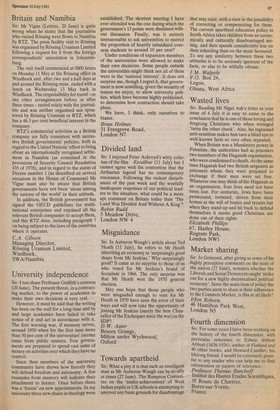Britain and Namibia
Sir: Mr Vigne (Letters, 20 June) is quite wrong when he states that the journalists who visited ROssing were flown to Namibia by RTZ. The press facility visit to ROssing was organised by Missing Uranium Limited following a request for it from the foreign correspondents' association in Johannesburg.
The visit itself commenced at 0800 hours on Monday 11 May at the Missing office in Windhoek and, after two and a half days at and around the Rossing mine, ended with a lunch on Wednesday 13 May back in Windhoek. The responsibility for travel — or any other arrangements before or after these times — rested solely with the journalists and was neither organised nor sponsored by Rossing Uranium or RTZ, which has a 46.5 per cent beneficial interest in the company. RTZ's commercial activities as a British company are fully consistent with successive British governments' policies, both in regard to the United Nations' effort to bring about an internationally recognised settlement in Namibia (as contained in the provisions of Security Council Resolution 435 of 1978), and in regard to the status of Decree number 1 (as described on several occasions in the House of Commons) Mr Vigne must also be aware that British governments have not been 'alone among the nations of the world' in their attitude.
In addition, the British government has signed the OECD guidelines for multinational enterprises and enjoined all the relevant British companies to accept them, and this RTZ does, including paragraph 7 on being subject to the laws of the countries where it operates.
C.A. Gibson
Managing Director, Rossing Uranium Limited, Windhoek, SWA/Namibia


































 Previous page
Previous page